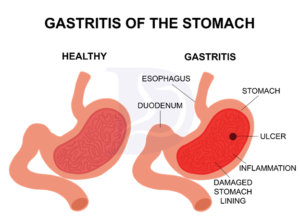Gastritis

Any of a group of conditions in which the stomach lining is inflamed.
Gastritis is a general term for a group of conditions with one thing in common: inflammation of the lining of the stomach. The inflammation of gastritis is most often the result of infection with the same bacterium that causes most stomach ulcers. Gastritis may occur suddenly (acute gastritis) or appear slowly over time (chronic gastritis). In some cases, gastritis can lead to ulcers and an increased risk of stomach cancer.
Causes include infection, injury, regular use of pain pills called NSAIDs and too much alcohol.
Signs and symptoms of gastritis include:
Gnawing or burning ache or pain (indigestion) in your upper abdomen that may become either worse or better with eating, Nausea, Vomiting, A feeling of fullness in your upper abdomen after eating
Symptoms of gastritis vary among individuals, and in many people there are no symptoms. However, the most common symptoms include: Nausea or recurrent upset stomach, Abdominal bloating, Abdominal pain, Vomiting, Indigestion, Burning or gnawing feeling in the stomach between meals or at night, Hiccups, Loss of appetite.


